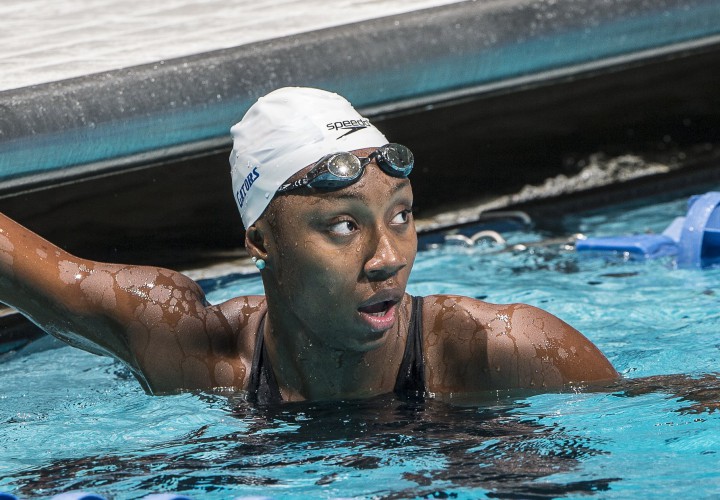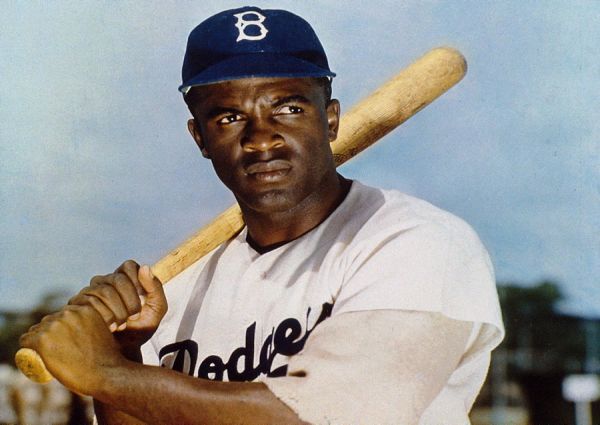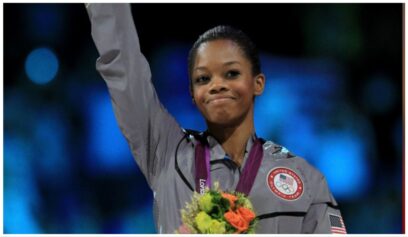It was an unprecedented event for NCAA swimming. It was as symbolic as it was historic in that it provided a revealing reality concerning the sport of swimming and marked the official introduction of the African-American woman as a force in an arena that has failed to attract or embrace her in the past.

It was not too long ago in 1987when the legendary, racist rant by ex-Dodger VP Al Campanis on Nightline hosted by Ted Koppel harshly and bluntly expressed what a large portion of America still felt about African-Americans. Campanis said blacks lacked the necessities to be managers or executives, pitchers and quarterbacks. His most infamous quote came in defense of his absurd assertions. Campanis asked Koppel, Why are black people not good swimmers? Then Campanis answered his own question. Because they dont have the buoyancy.
A flabbergasted and obviously agitated Koppel responded, Id say that its because they dont have access to the country clubs and the pools.
It wasnt just that Campanis remarks were foul, racially-charged and outdated. As a respected and powerful baseball executive who once roomed with Jackie Robinson as members of the barrier-breaking Dodgers organization, Campanis remarks sparked a storm of criticism, particularly from the black community and put Major League Baseball’s hiring practices under intense scrutiny.
Campanis was fired shortly after. Black swimmers have since proved their “bouyancy” and have more access to the country clubs and swimming pools than ever.
Similar to sports such as golf, ice skating and gymnastics, swimming has long been considered by primitive minds as an athletic endeavor that is an unnatural fit for African-Americans.
With three African-American swimmers sweeping the podium in the 100 yard freestyle at the Women’s Division 1 NCAA Championship this past weekend (a feat recognized by the national governing body of swimming in the United States with a celebratory tweet) its clear that a swimming blackout is upon us.
Freshman phenom Simone Manuel of Stanford set an NCAA, American, U.S. Open, Championship and Pool record when she clocked a time of 46.09 in the women’s 100 yard freestyle.
Manuel’s Stanford teammate Lia Neal came in second place with a time of 47.13.
Neal is no stranger to star-studded success. Raised in the Fort Greene section of BK by her parents Rome and Siu Neal, who are of African-American and Chinese-American descent, Lia is already a pioneer for black woman in swimming as she won a bronze medal in the 4×100 free relay at the 2012 Olympic Games in London.
Her being a part of this landmark moment in NCAA swimming makes total sense.
The University of Florida’s Natalie Hinds swam a time of 47.24. Hinds reset her own-school record in the event during competition.
Teammates Manuel and Neal spoke to Swimming World magazine about their game plan before also winning the 400 yard freestyle relay.
Neal led the first leg of the race and Manuel anchored it and produced poetry in motion. They smashed the American record in the relay by 2 seconds and the US Open/NCAA Record by a full second.
These water warriors will forever be credited with breaking down a wall and shattering another modern-day barrier for African-American women. However,The Originator, The Jackie Robinson of womens swimming is Maritza Correia-McClendon.
When she qualified for the USA
Who better than McClendon to reflect on the moment and share her feelings? SwimSwam.com had a dope first-person piece by Maritza, expressing just what the three pool panthers accomplishments mean to the culture of swimming.
Maritza McClendon: “A tear instantly came to my eyes, I couldnt believe it This is a true moment in history for minorities. I still cant believe we had three women of color take 1, 2, 3 in the 100 free at Division 1 NCAA Swimming and Diving Championships.”
I will always remember my first interview at Olympic trials when asked how I felt about being a role model for minorities. My answer, Im honored to be the first, but I dont want to be the last. What these three ladies have done, is not only made leaps in their personal careers, but have continued on the path that was set many years ago and taken it to unthinkable heights.
Its truly a proud moment to be able to see the changes in how many minorities are reaching high levels in swimming.
Since winning my Olympic silver medal in 2004, I always kept an eye out for who was new to the pool deck. From watching Byron Davis, Sabir Muhammad, Michael Norment, Atiba Wade, Neka Mabry, and Allison Terry. To being on the same teams with Tanica Jameson, Kelley Robins, Cullen Jones,and Brielle White. To now watching Dax Hill, Giles Smith, Arianna Vanderpool Wallace, Alia Atkinson, Simone Manuel, Lia Neal, and Natalie Hinds continuing to break barriers and bringing light to the fact that Black people can swim and we do it well.
Thats an indisputable fact now.



